-
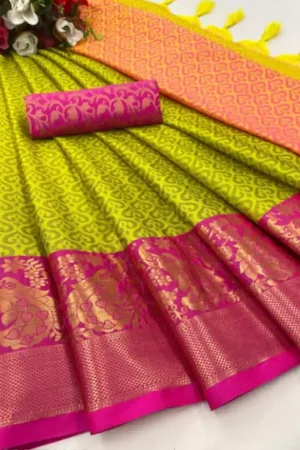 Sana Silk Lime Green Petite Silk Saree Peacock BorderOriginal price was: ₹8,755.00.₹1,749.00Current price is: ₹1,749.00.
Sana Silk Lime Green Petite Silk Saree Peacock BorderOriginal price was: ₹8,755.00.₹1,749.00Current price is: ₹1,749.00. -
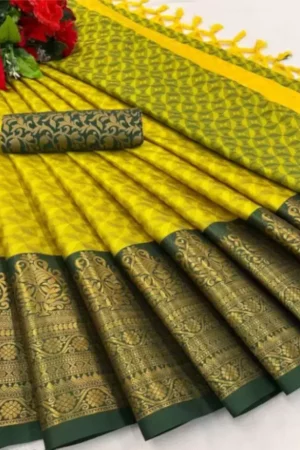 Bridal Silk Floral Party wear Saree in Lemon Yellow ColorOriginal price was: ₹8,800.00.₹1,539.00Current price is: ₹1,539.00.
Bridal Silk Floral Party wear Saree in Lemon Yellow ColorOriginal price was: ₹8,800.00.₹1,539.00Current price is: ₹1,539.00. -
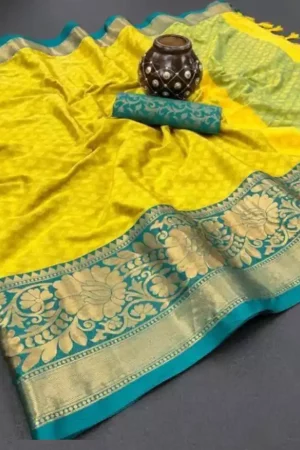 Yellow Butta Silk Saree Blue Golden Embroidered Floral Work SareeOriginal price was: ₹9,899.00.₹1,649.00Current price is: ₹1,649.00.
Yellow Butta Silk Saree Blue Golden Embroidered Floral Work SareeOriginal price was: ₹9,899.00.₹1,649.00Current price is: ₹1,649.00. -
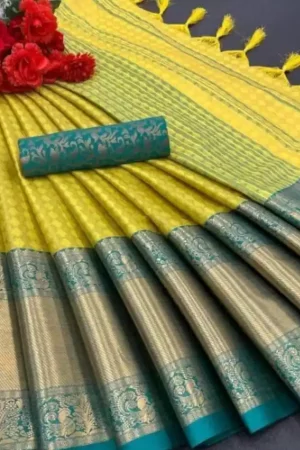 Yellow Silk Saree Blue Floral Motif BorderOriginal price was: ₹8,895.00.₹1,549.00Current price is: ₹1,549.00.
Yellow Silk Saree Blue Floral Motif BorderOriginal price was: ₹8,895.00.₹1,549.00Current price is: ₹1,549.00. -
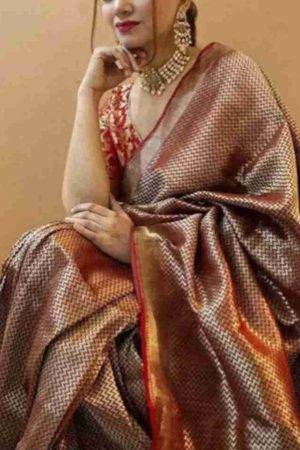 Buy Gold Silk Saree Red Zigzag Work with Floral Blouse OnlineOriginal price was: ₹6,755.00.₹1,200.00Current price is: ₹1,200.00.
Buy Gold Silk Saree Red Zigzag Work with Floral Blouse OnlineOriginal price was: ₹6,755.00.₹1,200.00Current price is: ₹1,200.00. -
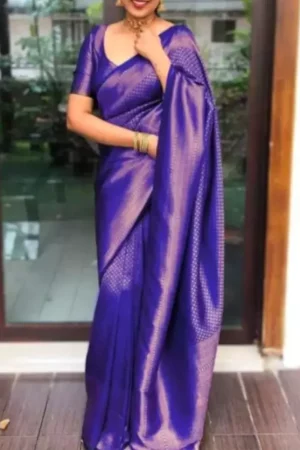 Silk Floral Party wear Saree in Deep Purple Tamarind ColorOriginal price was: ₹8,800.00.₹1,559.00Current price is: ₹1,559.00.
Silk Floral Party wear Saree in Deep Purple Tamarind ColorOriginal price was: ₹8,800.00.₹1,559.00Current price is: ₹1,559.00. -
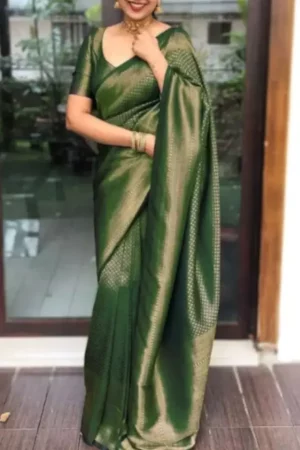 Buy Green Silk Saree Floral work and Border OnlineOriginal price was: ₹8,700.00.₹1,559.00Current price is: ₹1,559.00.
Buy Green Silk Saree Floral work and Border OnlineOriginal price was: ₹8,700.00.₹1,559.00Current price is: ₹1,559.00. -
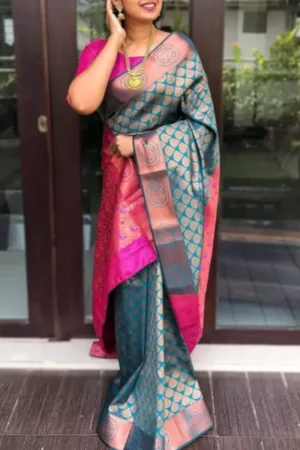 Buy Sea Blue Silk Saree Gold Embroidered Floral Work Pink Border OnlineOriginal price was: ₹6,879.00.₹1,449.00Current price is: ₹1,449.00.
Buy Sea Blue Silk Saree Gold Embroidered Floral Work Pink Border OnlineOriginal price was: ₹6,879.00.₹1,449.00Current price is: ₹1,449.00. -
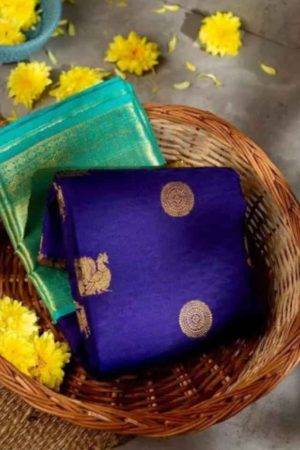 Buy Purple Silk Saree Peacock Floral Design Blue Border Zari Work OnlineOriginal price was: ₹8,562.00.₹1,299.00Current price is: ₹1,299.00.
Buy Purple Silk Saree Peacock Floral Design Blue Border Zari Work OnlineOriginal price was: ₹8,562.00.₹1,299.00Current price is: ₹1,299.00. -
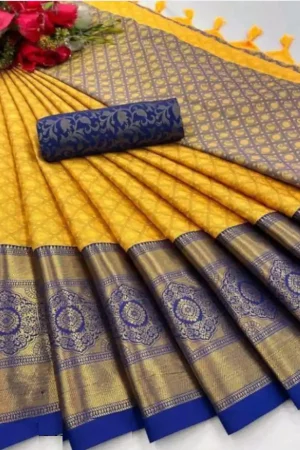 Mustard Yellow Silk Saree Embroidered Blue BorderOriginal price was: ₹9,899.00.₹1,499.00Current price is: ₹1,499.00.
Mustard Yellow Silk Saree Embroidered Blue BorderOriginal price was: ₹9,899.00.₹1,499.00Current price is: ₹1,499.00. -
 Navy Blue Silk Saree Floral Design Zari Work Border OnlineOriginal price was: ₹9,890.00.₹1,489.00Current price is: ₹1,489.00.
Navy Blue Silk Saree Floral Design Zari Work Border OnlineOriginal price was: ₹9,890.00.₹1,489.00Current price is: ₹1,489.00. -
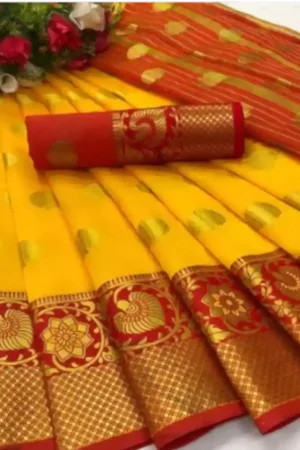 Yellow Red Floral Zari Kanjivaram Silk SareeOriginal price was: ₹6,755.00.₹2,400.00Current price is: ₹2,400.00.
Yellow Red Floral Zari Kanjivaram Silk SareeOriginal price was: ₹6,755.00.₹2,400.00Current price is: ₹2,400.00. -
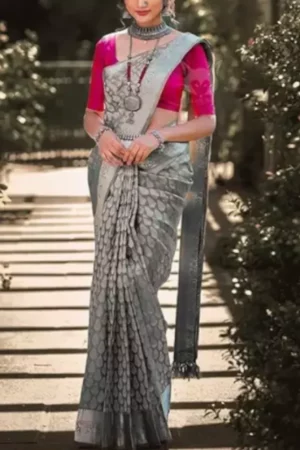 Grey Kanjeevaram Pattu SareeOriginal price was: ₹8,796.00.₹2,700.00Current price is: ₹2,700.00.
Grey Kanjeevaram Pattu SareeOriginal price was: ₹8,796.00.₹2,700.00Current price is: ₹2,700.00. -
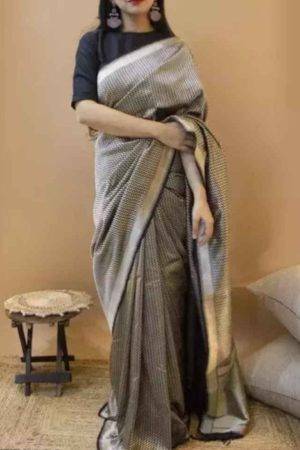 Buy Grey Silk Saree with Black Zigzag Floral Work OnlineOriginal price was: ₹6,755.00.₹1,200.00Current price is: ₹1,200.00.
Buy Grey Silk Saree with Black Zigzag Floral Work OnlineOriginal price was: ₹6,755.00.₹1,200.00Current price is: ₹1,200.00. -
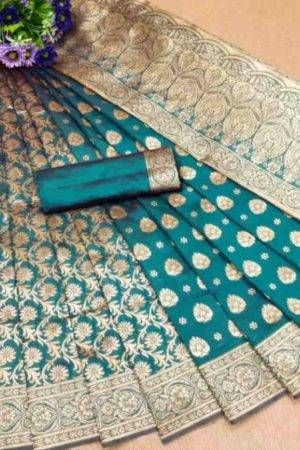 Buy Aqua Blue Silk Saree Floral Zari Work OnlineOriginal price was: ₹4,599.00.₹1,199.00Current price is: ₹1,199.00.
Buy Aqua Blue Silk Saree Floral Zari Work OnlineOriginal price was: ₹4,599.00.₹1,199.00Current price is: ₹1,199.00. -
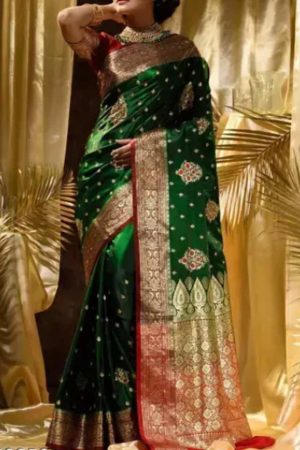 Buy Evergreen Floral Zari Work Saree Red Golden Border OnlineOriginal price was: ₹13,788.00.₹2,788.00Current price is: ₹2,788.00.
Buy Evergreen Floral Zari Work Saree Red Golden Border OnlineOriginal price was: ₹13,788.00.₹2,788.00Current price is: ₹2,788.00. -
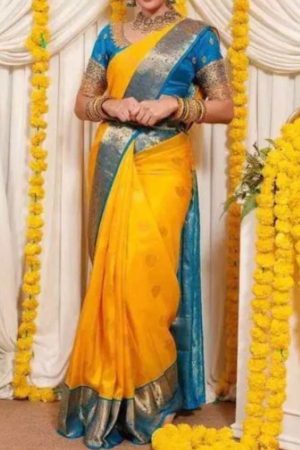 Buy Yellow Gold Floral Silk Saree Blue Border Zari Work OnlineOriginal price was: ₹12,450.00.₹1,560.00Current price is: ₹1,560.00.
Buy Yellow Gold Floral Silk Saree Blue Border Zari Work OnlineOriginal price was: ₹12,450.00.₹1,560.00Current price is: ₹1,560.00. -
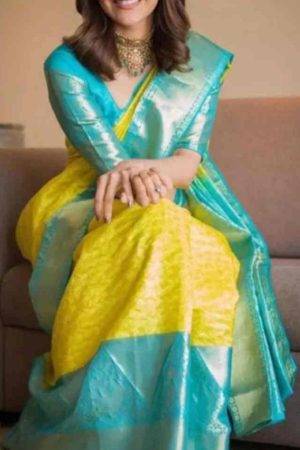 Buy Yellow Silk Saree Blue Border Floral Work OnlineOriginal price was: ₹7,800.00.₹1,399.00Current price is: ₹1,399.00.
Buy Yellow Silk Saree Blue Border Floral Work OnlineOriginal price was: ₹7,800.00.₹1,399.00Current price is: ₹1,399.00. -
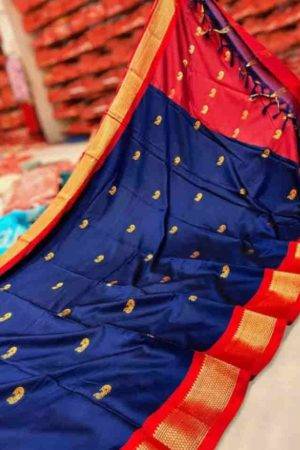 Buy Blue Silk Saree Butta Red Zari Border Work OnlineOriginal price was: ₹6,755.00.₹1,249.00Current price is: ₹1,249.00.
Buy Blue Silk Saree Butta Red Zari Border Work OnlineOriginal price was: ₹6,755.00.₹1,249.00Current price is: ₹1,249.00. -
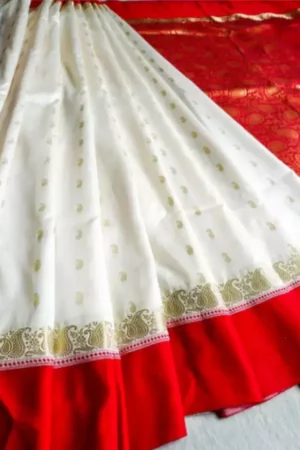 Buy White Saree Golden Butti Work Red Border OnlineOriginal price was: ₹7,869.00.₹1,669.00Current price is: ₹1,669.00.
Buy White Saree Golden Butti Work Red Border OnlineOriginal price was: ₹7,869.00.₹1,669.00Current price is: ₹1,669.00. -
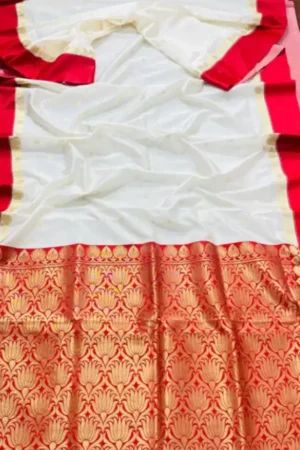 Buy White Saree Red Golden Floral Border Work OnlineOriginal price was: ₹7,589.00.₹1,449.00Current price is: ₹1,449.00.
Buy White Saree Red Golden Floral Border Work OnlineOriginal price was: ₹7,589.00.₹1,449.00Current price is: ₹1,449.00. -
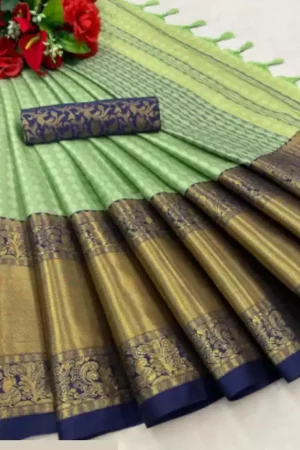 Bridal Green Designer Paithani Silk Jacquard Party wear SareeOriginal price was: ₹12,366.00.₹1,649.00Current price is: ₹1,649.00.
Bridal Green Designer Paithani Silk Jacquard Party wear SareeOriginal price was: ₹12,366.00.₹1,649.00Current price is: ₹1,649.00. -
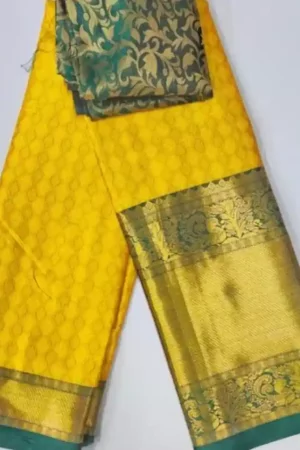 Buy Lemon Yellow Saree Golden Green Peacock Border OnlineOriginal price was: ₹9,879.00.₹1,159.00Current price is: ₹1,159.00.
Buy Lemon Yellow Saree Golden Green Peacock Border OnlineOriginal price was: ₹9,879.00.₹1,159.00Current price is: ₹1,159.00. -
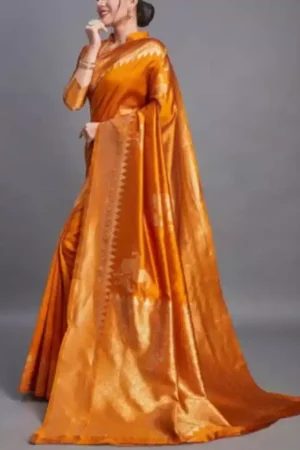 Buy Orange Silk Saree Golden Floral Work Border OnlineOriginal price was: ₹9,769.00.₹1,649.00Current price is: ₹1,649.00.
Buy Orange Silk Saree Golden Floral Work Border OnlineOriginal price was: ₹9,769.00.₹1,649.00Current price is: ₹1,649.00. -
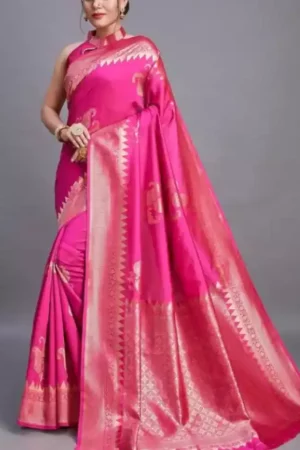 Buy Pink Silk Saree Golden Floral Work Border OnlineOriginal price was: ₹9,769.00.₹1,649.00Current price is: ₹1,649.00.
Buy Pink Silk Saree Golden Floral Work Border OnlineOriginal price was: ₹9,769.00.₹1,649.00Current price is: ₹1,649.00. -
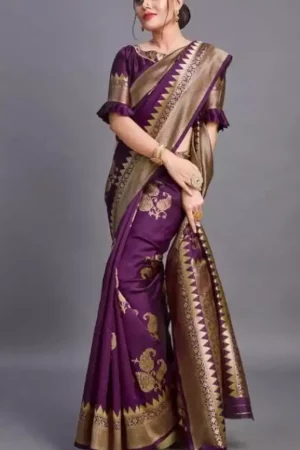 Buy Purple Silk Saree Golden Floral Work Border OnlineOriginal price was: ₹9,769.00.₹1,649.00Current price is: ₹1,649.00.
Buy Purple Silk Saree Golden Floral Work Border OnlineOriginal price was: ₹9,769.00.₹1,649.00Current price is: ₹1,649.00. -
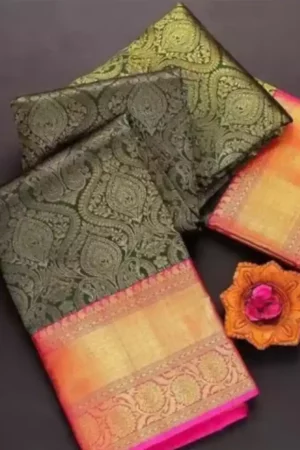 Buy Green Silk Saree Floral Work Pink Border OnlineOriginal price was: ₹8,769.00.₹1,649.00Current price is: ₹1,649.00.
Buy Green Silk Saree Floral Work Pink Border OnlineOriginal price was: ₹8,769.00.₹1,649.00Current price is: ₹1,649.00. -
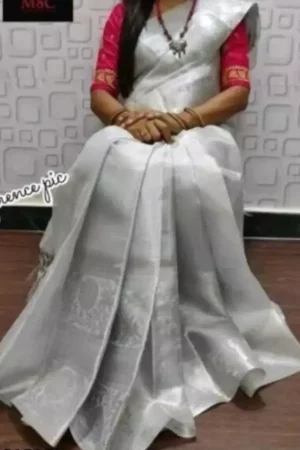 Buy Silver White Silk Saree Floral Work Silver Border OnlineOriginal price was: ₹8,699.00.₹1,549.00Current price is: ₹1,549.00.
Buy Silver White Silk Saree Floral Work Silver Border OnlineOriginal price was: ₹8,699.00.₹1,549.00Current price is: ₹1,549.00. -
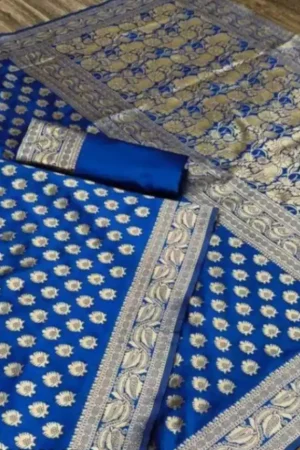 Bridal Navy Blue Designer Paithani Silk Jacquard Party wear SareeOriginal price was: ₹12,366.00.₹1,449.00Current price is: ₹1,449.00.
Bridal Navy Blue Designer Paithani Silk Jacquard Party wear SareeOriginal price was: ₹12,366.00.₹1,449.00Current price is: ₹1,449.00. -
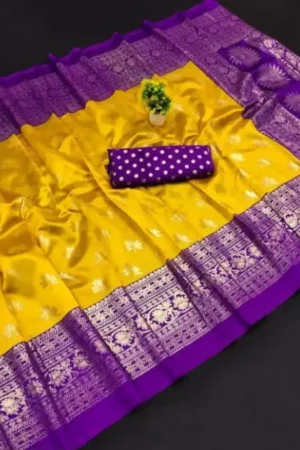 Buy Yellow Chikankari Saree Purple Border Floral Golden work OnlineOriginal price was: ₹5,799.00.₹1,549.00Current price is: ₹1,549.00.
Buy Yellow Chikankari Saree Purple Border Floral Golden work OnlineOriginal price was: ₹5,799.00.₹1,549.00Current price is: ₹1,549.00. -
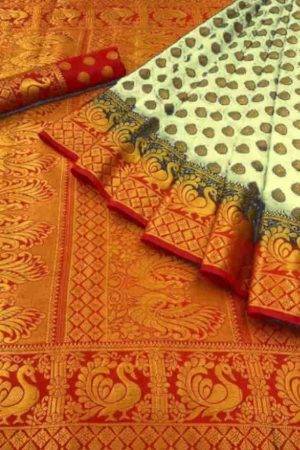 Buy White Red Silk Saree Peacock Motif Jacquard Design OnlineOriginal price was: ₹6,755.00.₹1,309.00Current price is: ₹1,309.00.
Buy White Red Silk Saree Peacock Motif Jacquard Design OnlineOriginal price was: ₹6,755.00.₹1,309.00Current price is: ₹1,309.00. -
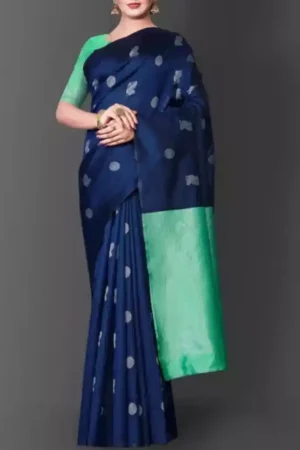 Blue Cotton Silk Woven Design SareeOriginal price was: ₹6,755.00.₹1,440.00Current price is: ₹1,440.00.
Blue Cotton Silk Woven Design SareeOriginal price was: ₹6,755.00.₹1,440.00Current price is: ₹1,440.00. -
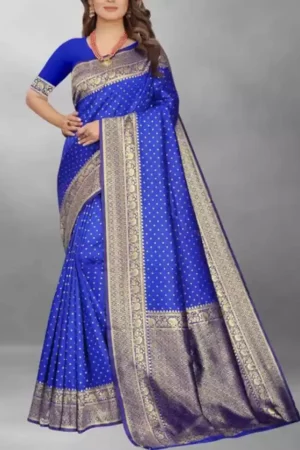 Navy Blue Banarasi Silk SareeOriginal price was: ₹7,869.00.₹1,249.00Current price is: ₹1,249.00.
Navy Blue Banarasi Silk SareeOriginal price was: ₹7,869.00.₹1,249.00Current price is: ₹1,249.00. -
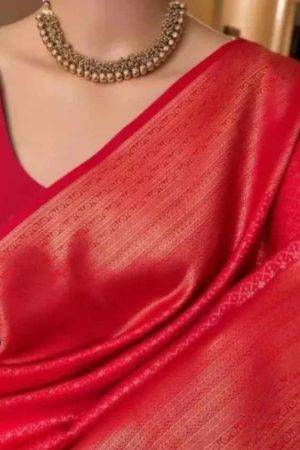 Buy Bridal Red Pattu Saree Zari Work Floral Butta Border OnlineOriginal price was: ₹8,799.00.₹1,149.00Current price is: ₹1,149.00.
Buy Bridal Red Pattu Saree Zari Work Floral Butta Border OnlineOriginal price was: ₹8,799.00.₹1,149.00Current price is: ₹1,149.00. -
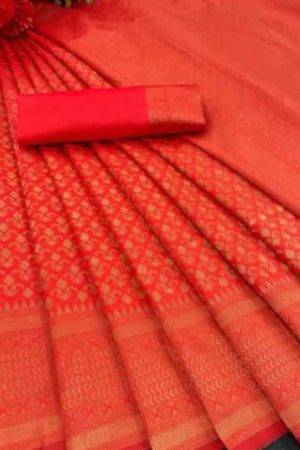 Buy Cherry Red Pattu Saree Zari Work Floral Border OnlineOriginal price was: ₹8,768.00.₹1,149.00Current price is: ₹1,149.00.
Buy Cherry Red Pattu Saree Zari Work Floral Border OnlineOriginal price was: ₹8,768.00.₹1,149.00Current price is: ₹1,149.00. -
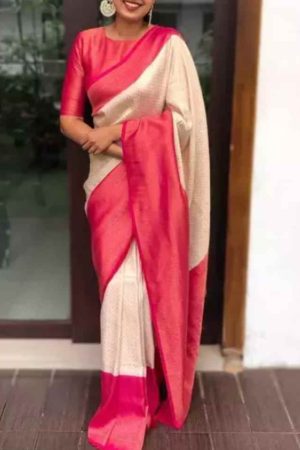 Buy White Pattu Saree Pink Border OnlineOriginal price was: ₹11,520.00.₹2,200.00Current price is: ₹2,200.00.
Buy White Pattu Saree Pink Border OnlineOriginal price was: ₹11,520.00.₹2,200.00Current price is: ₹2,200.00. -
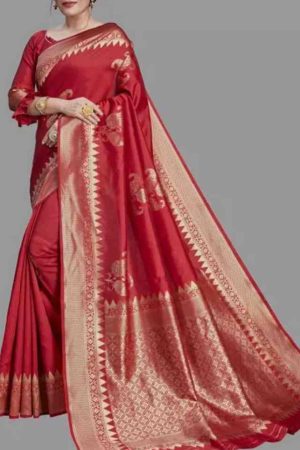 Buy Red Pattu Saree Golden Zari Border OnlineOriginal price was: ₹8,596.00.₹1,850.00Current price is: ₹1,850.00.
Buy Red Pattu Saree Golden Zari Border OnlineOriginal price was: ₹8,596.00.₹1,850.00Current price is: ₹1,850.00. -
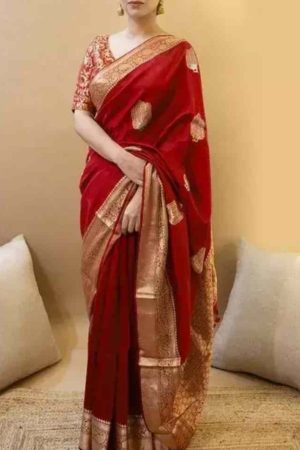 Buy Red Pattu Saree Golden Floral Zari Work Border OnlineOriginal price was: ₹7,589.00.₹1,669.00Current price is: ₹1,669.00.
Buy Red Pattu Saree Golden Floral Zari Work Border OnlineOriginal price was: ₹7,589.00.₹1,669.00Current price is: ₹1,669.00. -
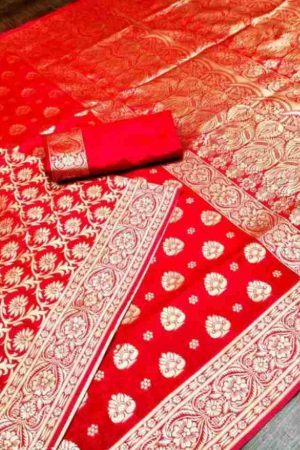 Buy Bridal Red Silk Saree Golden Floral Zari Work OnlineOriginal price was: ₹7,899.00.₹1,640.00Current price is: ₹1,640.00.
Buy Bridal Red Silk Saree Golden Floral Zari Work OnlineOriginal price was: ₹7,899.00.₹1,640.00Current price is: ₹1,640.00. -
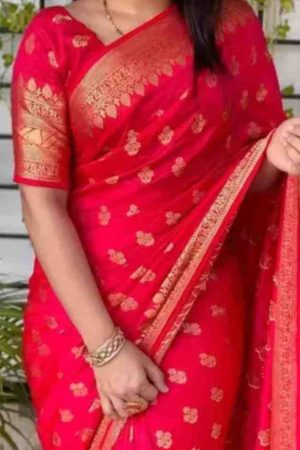 Buy Bridal Red Silk Saree Floral Golden Zari Work OnlineOriginal price was: ₹15,480.00.₹1,500.00Current price is: ₹1,500.00.
Buy Bridal Red Silk Saree Floral Golden Zari Work OnlineOriginal price was: ₹15,480.00.₹1,500.00Current price is: ₹1,500.00. -
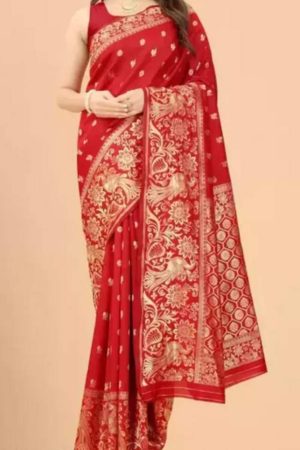 Buy Red Bridal Peacock Floral Silk Saree Golden Zari Work Border OnlineOriginal price was: ₹12,340.00.₹2,999.00Current price is: ₹2,999.00.
Buy Red Bridal Peacock Floral Silk Saree Golden Zari Work Border OnlineOriginal price was: ₹12,340.00.₹2,999.00Current price is: ₹2,999.00. -
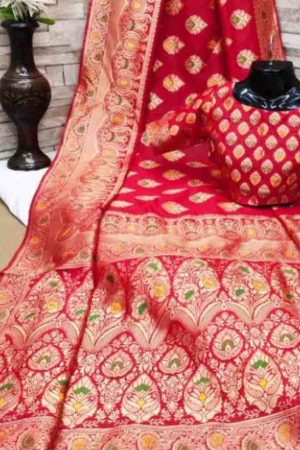 Buy Bridal Red Silk Saree Floral Zari Embroidery Work OnlineOriginal price was: ₹16,690.00.₹2,669.00Current price is: ₹2,669.00.
Buy Bridal Red Silk Saree Floral Zari Embroidery Work OnlineOriginal price was: ₹16,690.00.₹2,669.00Current price is: ₹2,669.00. -
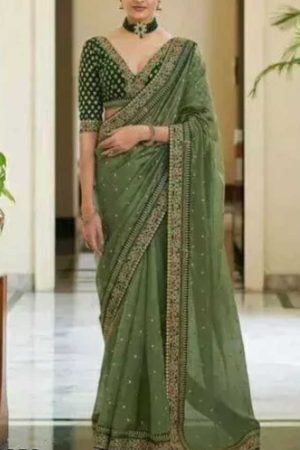 Buy Pista Green Silk Saree Floral Embroidery Work OnlineOriginal price was: ₹17,499.00.₹2,669.00Current price is: ₹2,669.00.
Buy Pista Green Silk Saree Floral Embroidery Work OnlineOriginal price was: ₹17,499.00.₹2,669.00Current price is: ₹2,669.00. -
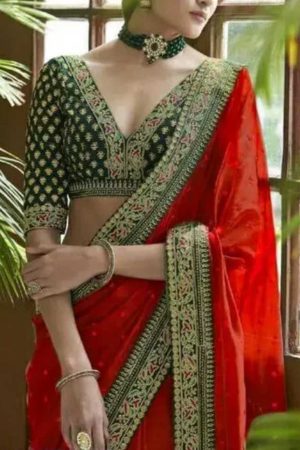 Buy Bridal Red Silk Saree Floral Embroidery Work OnlineOriginal price was: ₹16,399.00.₹2,739.00Current price is: ₹2,739.00.
Buy Bridal Red Silk Saree Floral Embroidery Work OnlineOriginal price was: ₹16,399.00.₹2,739.00Current price is: ₹2,739.00. -
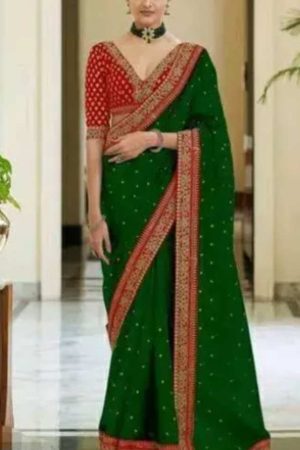 Buy Dark Green Silk Saree Floral Embroidery Work OnlineOriginal price was: ₹16,399.00.₹2,669.00Current price is: ₹2,669.00.
Buy Dark Green Silk Saree Floral Embroidery Work OnlineOriginal price was: ₹16,399.00.₹2,669.00Current price is: ₹2,669.00. -
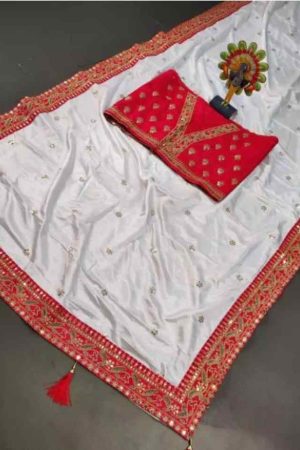 Buy White Silk Saree Floral Embroidery Work OnlineOriginal price was: ₹17,399.00.₹2,669.00Current price is: ₹2,669.00.
Buy White Silk Saree Floral Embroidery Work OnlineOriginal price was: ₹17,399.00.₹2,669.00Current price is: ₹2,669.00. -
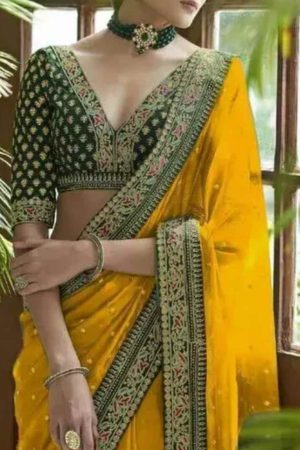 Buy Yellow Silk Saree Floral Embroidery Work OnlineOriginal price was: ₹7,399.00.₹1,669.00Current price is: ₹1,669.00.
Buy Yellow Silk Saree Floral Embroidery Work OnlineOriginal price was: ₹7,399.00.₹1,669.00Current price is: ₹1,669.00. -
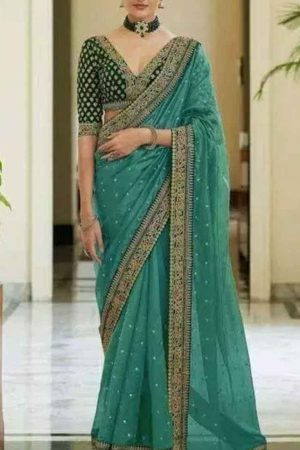 Buy Cyan Silk Saree Floral Embroidery Work OnlineOriginal price was: ₹16,399.00.₹2,779.00Current price is: ₹2,779.00.
Buy Cyan Silk Saree Floral Embroidery Work OnlineOriginal price was: ₹16,399.00.₹2,779.00Current price is: ₹2,779.00. -
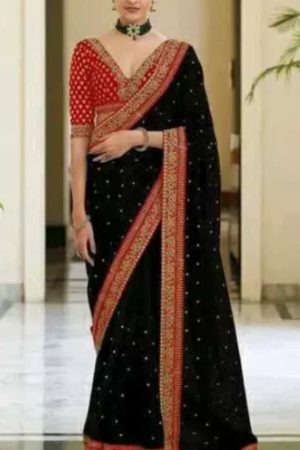 Buy Black Silk Saree Floral Embroidery Work OnlineOriginal price was: ₹16,399.00.₹2,650.00Current price is: ₹2,650.00.
Buy Black Silk Saree Floral Embroidery Work OnlineOriginal price was: ₹16,399.00.₹2,650.00Current price is: ₹2,650.00. -
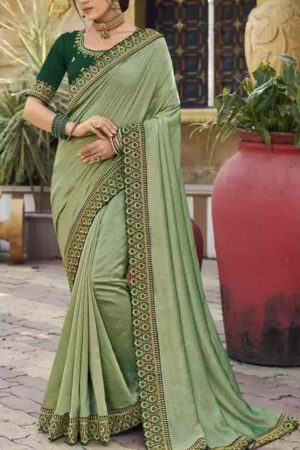 Buy Pista Green Silk Saree Floral Embroidered Border OnlineOriginal price was: ₹15,990.00.₹2,450.00Current price is: ₹2,450.00.
Buy Pista Green Silk Saree Floral Embroidered Border OnlineOriginal price was: ₹15,990.00.₹2,450.00Current price is: ₹2,450.00. -
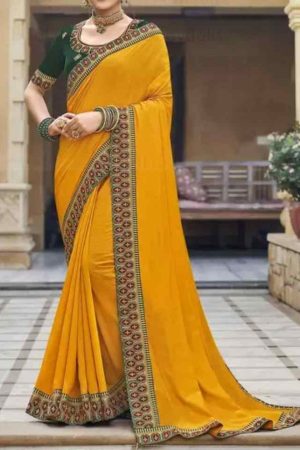 Buy Mustard Yellow Silk Saree Floral Embroidered Border OnlineOriginal price was: ₹15,990.00.₹2,450.00Current price is: ₹2,450.00.
Buy Mustard Yellow Silk Saree Floral Embroidered Border OnlineOriginal price was: ₹15,990.00.₹2,450.00Current price is: ₹2,450.00. -
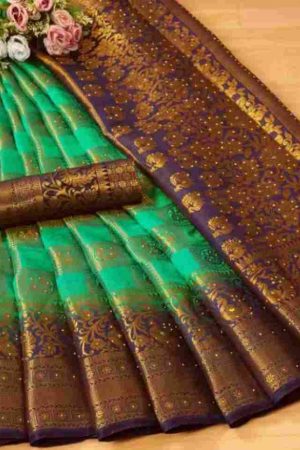 Buy Green Silk Saree Golden Peacock Embroidery Work Purple Border OnlineOriginal price was: ₹13,660.00.₹2,650.00Current price is: ₹2,650.00.
Buy Green Silk Saree Golden Peacock Embroidery Work Purple Border OnlineOriginal price was: ₹13,660.00.₹2,650.00Current price is: ₹2,650.00. -
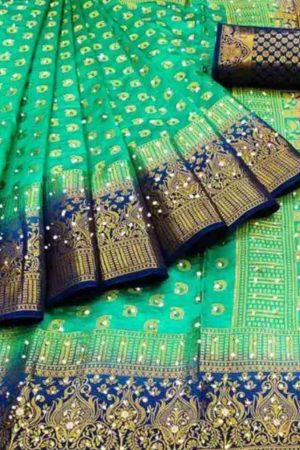 Buy Green Silk Saree Blue Diamond Embroidery Work Border OnlineOriginal price was: ₹12,450.00.₹2,459.00Current price is: ₹2,459.00.
Buy Green Silk Saree Blue Diamond Embroidery Work Border OnlineOriginal price was: ₹12,450.00.₹2,459.00Current price is: ₹2,459.00. -
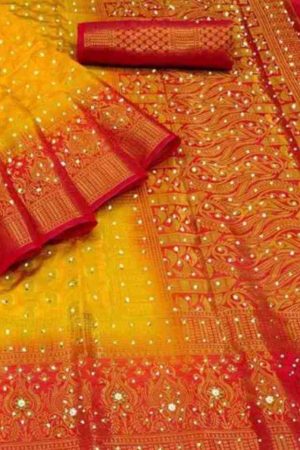 Buy Yellow Silk Saree Red Diamond Embroidery Work Border OnlineOriginal price was: ₹12,450.00.₹2,459.00Current price is: ₹2,459.00.
Buy Yellow Silk Saree Red Diamond Embroidery Work Border OnlineOriginal price was: ₹12,450.00.₹2,459.00Current price is: ₹2,459.00. -
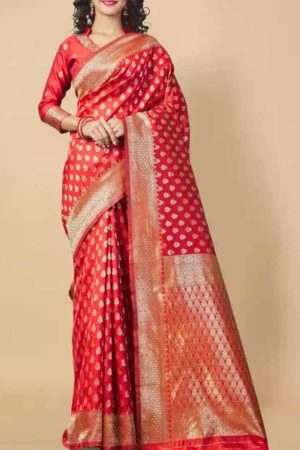 Buy Bridal Red Silk Saree Butta Zari Woven Work OnlineOriginal price was: ₹9,899.00.₹1,669.00Current price is: ₹1,669.00.
Buy Bridal Red Silk Saree Butta Zari Woven Work OnlineOriginal price was: ₹9,899.00.₹1,669.00Current price is: ₹1,669.00. -
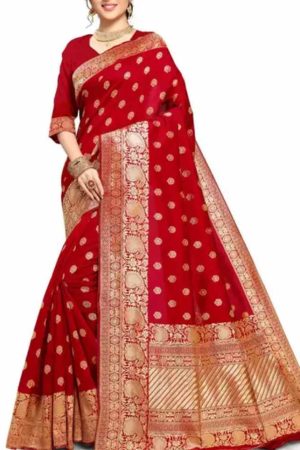 Buy Chilli Red Silk Saree Floral Zari Woven Work OnlineOriginal price was: ₹8,979.00.₹1,569.00Current price is: ₹1,569.00.
Buy Chilli Red Silk Saree Floral Zari Woven Work OnlineOriginal price was: ₹8,979.00.₹1,569.00Current price is: ₹1,569.00. -
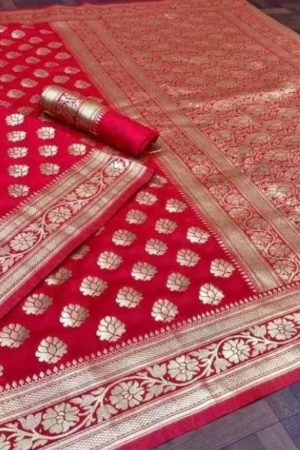 Buy Red Silk Saree Floral Zari Woven Work OnlineOriginal price was: ₹8,799.00.₹1,559.00Current price is: ₹1,559.00.
Buy Red Silk Saree Floral Zari Woven Work OnlineOriginal price was: ₹8,799.00.₹1,559.00Current price is: ₹1,559.00. -
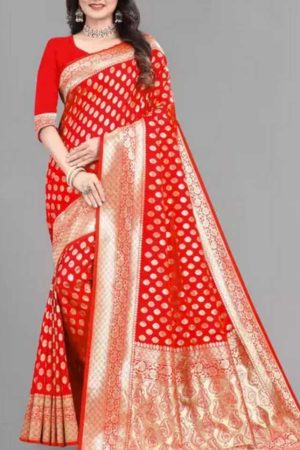 Buy Red Silk Saree Zari Woven Work Peacock Floral Golden Border OnlineOriginal price was: ₹16,559.00.₹2,898.00Current price is: ₹2,898.00.
Buy Red Silk Saree Zari Woven Work Peacock Floral Golden Border OnlineOriginal price was: ₹16,559.00.₹2,898.00Current price is: ₹2,898.00. -
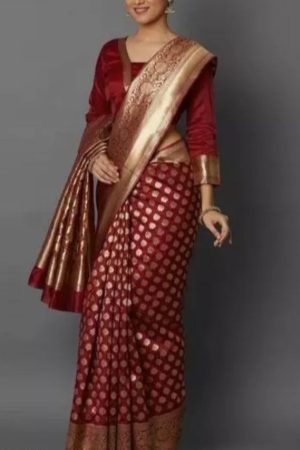 Buy Dark Red Silk Saree Zari Woven Floral Work OnlineOriginal price was: ₹9,987.00.₹1,999.00Current price is: ₹1,999.00.
Buy Dark Red Silk Saree Zari Woven Floral Work OnlineOriginal price was: ₹9,987.00.₹1,999.00Current price is: ₹1,999.00. -
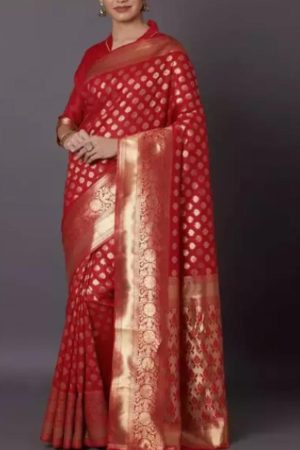 Buy Bridal Red Silk Saree Zari Woven Floral Work Golden Border OnlineOriginal price was: ₹13,569.00.₹1,670.00Current price is: ₹1,670.00.
Buy Bridal Red Silk Saree Zari Woven Floral Work Golden Border OnlineOriginal price was: ₹13,569.00.₹1,670.00Current price is: ₹1,670.00. -
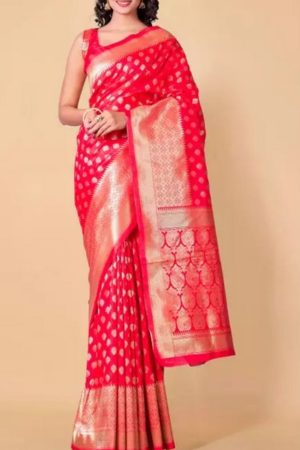 Buy Red Silk Saree Zari Woven Floral Work Golden Border OnlineOriginal price was: ₹15,499.00.₹2,200.00Current price is: ₹2,200.00.
Buy Red Silk Saree Zari Woven Floral Work Golden Border OnlineOriginal price was: ₹15,499.00.₹2,200.00Current price is: ₹2,200.00. -
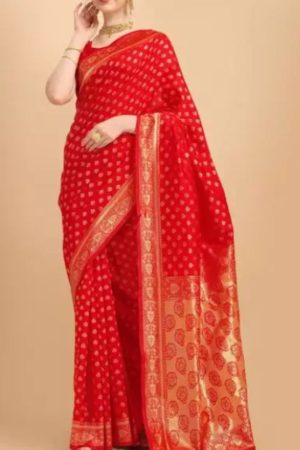 Buy Chilli Red Silk Saree Golden Zari Woven Work OnlineOriginal price was: ₹14,490.00.₹1,999.00Current price is: ₹1,999.00.
Buy Chilli Red Silk Saree Golden Zari Woven Work OnlineOriginal price was: ₹14,490.00.₹1,999.00Current price is: ₹1,999.00. -
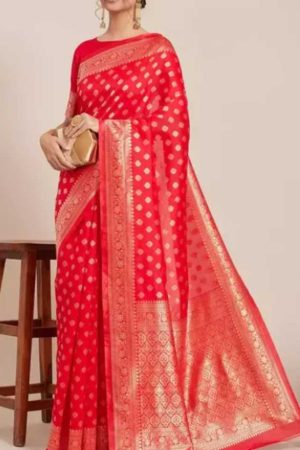 Buy Bridal Red Silk Saree Golden Zari Woven Work OnlineOriginal price was: ₹14,560.00.₹2,200.00Current price is: ₹2,200.00.
Buy Bridal Red Silk Saree Golden Zari Woven Work OnlineOriginal price was: ₹14,560.00.₹2,200.00Current price is: ₹2,200.00. -
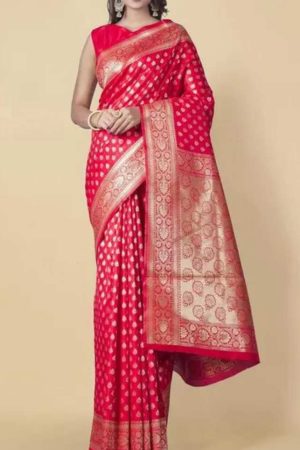 Buy Bridal Red Silk Saree Zari Woven Work Golden Border OnlineOriginal price was: ₹15,979.00.₹2,100.00Current price is: ₹2,100.00.
Buy Bridal Red Silk Saree Zari Woven Work Golden Border OnlineOriginal price was: ₹15,979.00.₹2,100.00Current price is: ₹2,100.00. -
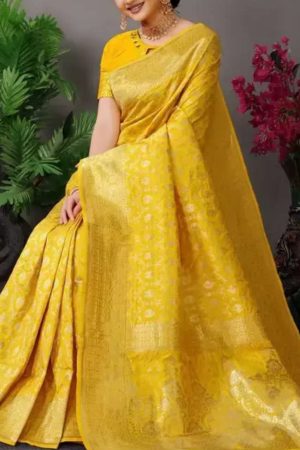 Buy Gold Yellow Silk Saree Gold Zari Work OnlineOriginal price was: ₹15,460.00.₹2,500.00Current price is: ₹2,500.00.
Buy Gold Yellow Silk Saree Gold Zari Work OnlineOriginal price was: ₹15,460.00.₹2,500.00Current price is: ₹2,500.00. -
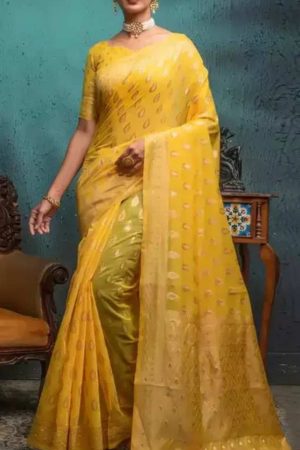 Buy Yellow Silk Saree Zari Woven Work Golden Border OnlineOriginal price was: ₹7,689.00.₹2,199.00Current price is: ₹2,199.00.
Buy Yellow Silk Saree Zari Woven Work Golden Border OnlineOriginal price was: ₹7,689.00.₹2,199.00Current price is: ₹2,199.00. -
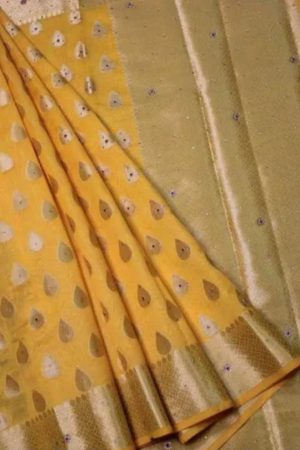 Buy Mustard Silk Saree Floral Zari Woven Work Golden Border OnlineOriginal price was: ₹9,766.00.₹1,999.00Current price is: ₹1,999.00.
Buy Mustard Silk Saree Floral Zari Woven Work Golden Border OnlineOriginal price was: ₹9,766.00.₹1,999.00Current price is: ₹1,999.00. -
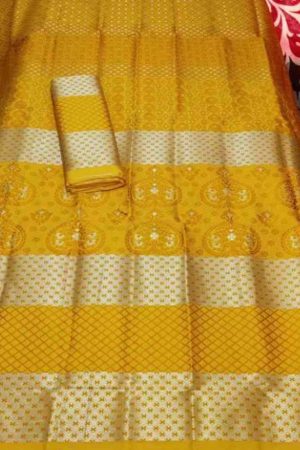 Buy Golden Silk Saree Zari Woven Floral OnlineOriginal price was: ₹9,699.00.₹2,690.00Current price is: ₹2,690.00.
Buy Golden Silk Saree Zari Woven Floral OnlineOriginal price was: ₹9,699.00.₹2,690.00Current price is: ₹2,690.00. -
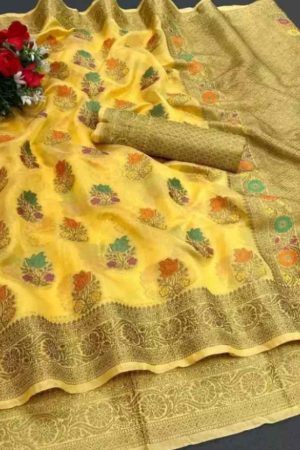 Buy Yellow Silk Saree Floral Embroidered Zari Woven Work Golden Border OnlineOriginal price was: ₹9,890.00.₹2,560.00Current price is: ₹2,560.00.
Buy Yellow Silk Saree Floral Embroidered Zari Woven Work Golden Border OnlineOriginal price was: ₹9,890.00.₹2,560.00Current price is: ₹2,560.00. -
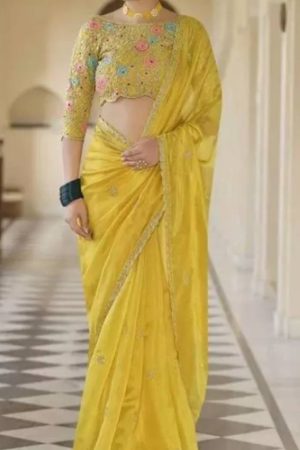 Buy Yellow Silk Saree Floral Embroidered Work Golden Border OnlineOriginal price was: ₹12,499.00.₹2,500.00Current price is: ₹2,500.00.
Buy Yellow Silk Saree Floral Embroidered Work Golden Border OnlineOriginal price was: ₹12,499.00.₹2,500.00Current price is: ₹2,500.00. -
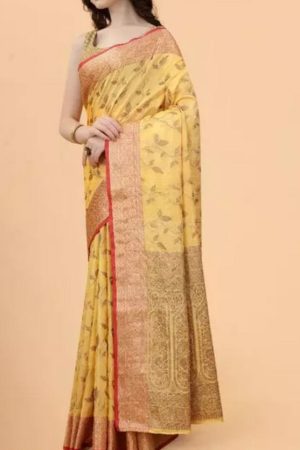 Buy Yellow Sand Silk Saree Zari Work Golden Border OnlineOriginal price was: ₹8,599.00.₹1,999.00Current price is: ₹1,999.00.
Buy Yellow Sand Silk Saree Zari Work Golden Border OnlineOriginal price was: ₹8,599.00.₹1,999.00Current price is: ₹1,999.00. -
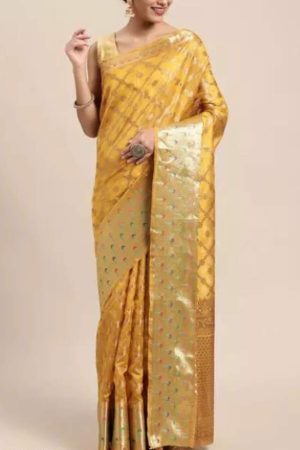 Buy Mustard Silk Saree Zari Work Golden Border OnlineOriginal price was: ₹15,460.00.₹1,999.00Current price is: ₹1,999.00.
Buy Mustard Silk Saree Zari Work Golden Border OnlineOriginal price was: ₹15,460.00.₹1,999.00Current price is: ₹1,999.00. -
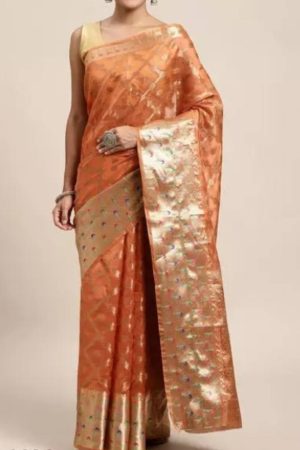 Buy Rust Brown Silk Saree Zari Work Golden Border OnlineOriginal price was: ₹15,460.00.₹1,999.00Current price is: ₹1,999.00.
Buy Rust Brown Silk Saree Zari Work Golden Border OnlineOriginal price was: ₹15,460.00.₹1,999.00Current price is: ₹1,999.00. -
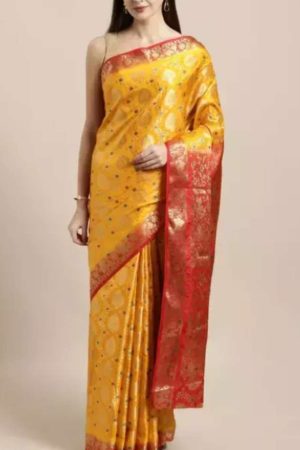 Buy Yellow Mustard Zari Work Red Border Silk Saree OnlineOriginal price was: ₹12,550.00.₹1,999.00Current price is: ₹1,999.00.
Buy Yellow Mustard Zari Work Red Border Silk Saree OnlineOriginal price was: ₹12,550.00.₹1,999.00Current price is: ₹1,999.00. -
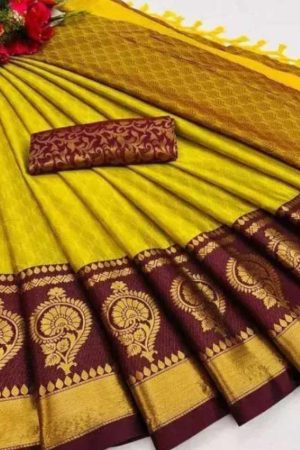 Buy Yellow Nugget Floral Silk Saree Brown Golden Border Zari Work OnlineOriginal price was: ₹11,340.00.₹1,269.00Current price is: ₹1,269.00.
Buy Yellow Nugget Floral Silk Saree Brown Golden Border Zari Work OnlineOriginal price was: ₹11,340.00.₹1,269.00Current price is: ₹1,269.00. -
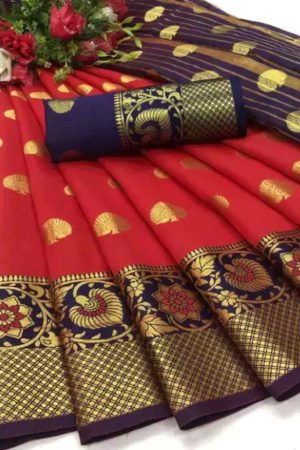 Buy Red Bridal Floral Silk Saree Blue Border Golden Zari Work OnlineOriginal price was: ₹13,860.00.₹1,560.00Current price is: ₹1,560.00.
Buy Red Bridal Floral Silk Saree Blue Border Golden Zari Work OnlineOriginal price was: ₹13,860.00.₹1,560.00Current price is: ₹1,560.00. -
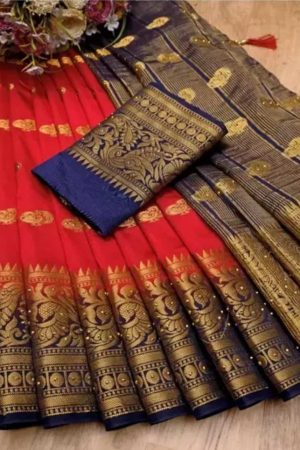 Buy Red Bridal Peacock Silk Saree Blue Border Golden Zari Work OnlineOriginal price was: ₹8,999.00.₹1,600.00Current price is: ₹1,600.00.
Buy Red Bridal Peacock Silk Saree Blue Border Golden Zari Work OnlineOriginal price was: ₹8,999.00.₹1,600.00Current price is: ₹1,600.00. -
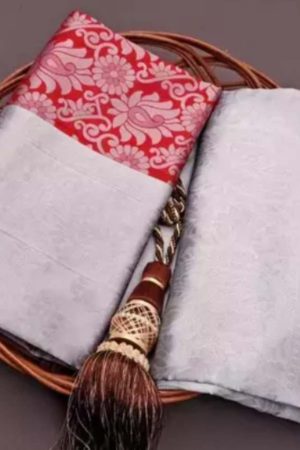 Copper Rust Red Bridal Floral Banarasi Silk Kanjeevaram SareeOriginal price was: ₹9,989.00.₹1,600.00Current price is: ₹1,600.00.
Copper Rust Red Bridal Floral Banarasi Silk Kanjeevaram SareeOriginal price was: ₹9,989.00.₹1,600.00Current price is: ₹1,600.00. -
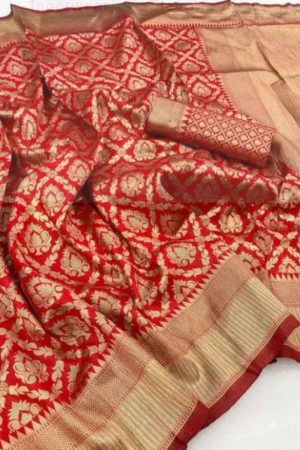 Red Bridal Floral Banarasi Silk SareeOriginal price was: ₹9,756.00.₹1,589.00Current price is: ₹1,589.00.
Red Bridal Floral Banarasi Silk SareeOriginal price was: ₹9,756.00.₹1,589.00Current price is: ₹1,589.00. -
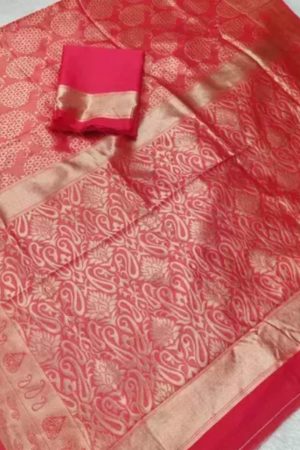 Red Bridal Floral Banarasi Saree Zari BorderOriginal price was: ₹12,350.00.₹1,446.00Current price is: ₹1,446.00.
Red Bridal Floral Banarasi Saree Zari BorderOriginal price was: ₹12,350.00.₹1,446.00Current price is: ₹1,446.00. -
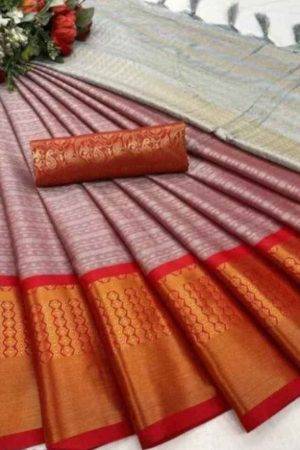 Buy Silk Saree Floral Zari Work OnlineOriginal price was: ₹7,899.00.₹1,399.00Current price is: ₹1,399.00.
Buy Silk Saree Floral Zari Work OnlineOriginal price was: ₹7,899.00.₹1,399.00Current price is: ₹1,399.00. -
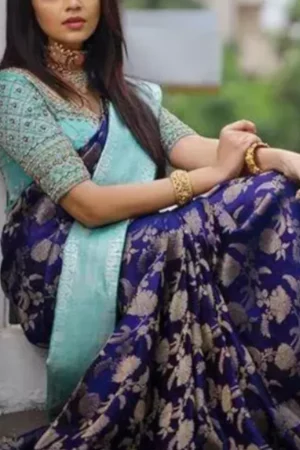 Cyan & Blue Silk Woven Floral Design Embroidered Pattu SareeOriginal price was: ₹9,869.00.₹1,399.00Current price is: ₹1,399.00.
Cyan & Blue Silk Woven Floral Design Embroidered Pattu SareeOriginal price was: ₹9,869.00.₹1,399.00Current price is: ₹1,399.00. -
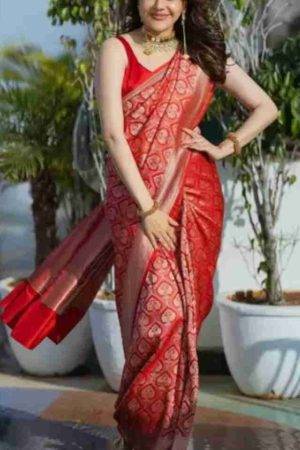 Buy Bridal Red Silk Saree Floral Zari Work OnlineOriginal price was: ₹8,790.00.₹1,170.00Current price is: ₹1,170.00.
Buy Bridal Red Silk Saree Floral Zari Work OnlineOriginal price was: ₹8,790.00.₹1,170.00Current price is: ₹1,170.00. -
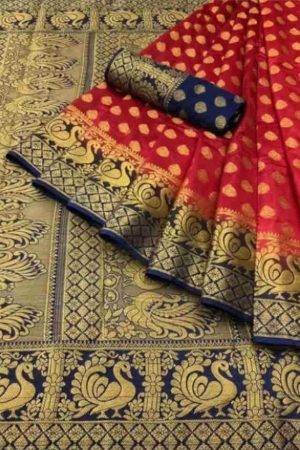 Black Red Silk Saree Peacock Motif Zari work OnlineOriginal price was: ₹6,755.00.₹1,299.00Current price is: ₹1,299.00.
Black Red Silk Saree Peacock Motif Zari work OnlineOriginal price was: ₹6,755.00.₹1,299.00Current price is: ₹1,299.00. -
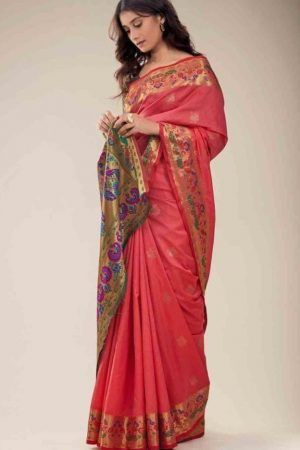 Tall Poppy Red Floral Paithani Silk Party wear SareeOriginal price was: ₹12,800.00.₹2,619.00Current price is: ₹2,619.00.
Tall Poppy Red Floral Paithani Silk Party wear SareeOriginal price was: ₹12,800.00.₹2,619.00Current price is: ₹2,619.00. -
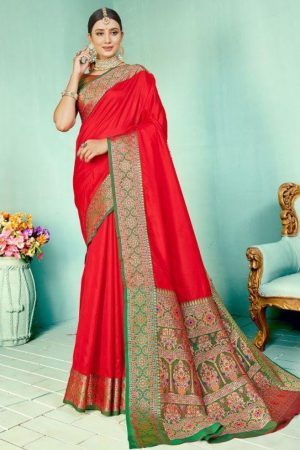 Bridal Cardinal Red Floral Paithani Silk Party wear SareeOriginal price was: ₹14,729.00.₹2,089.00Current price is: ₹2,089.00.
Bridal Cardinal Red Floral Paithani Silk Party wear SareeOriginal price was: ₹14,729.00.₹2,089.00Current price is: ₹2,089.00. -
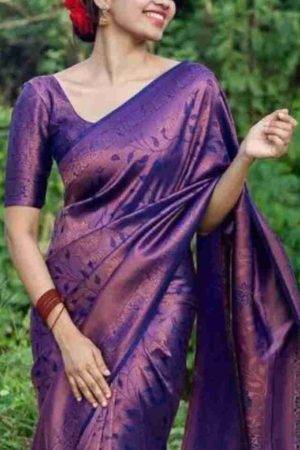 Buy Purple Silk Saree Floral Work OnlineOriginal price was: ₹12,768.00.₹1,249.00Current price is: ₹1,249.00.
Buy Purple Silk Saree Floral Work OnlineOriginal price was: ₹12,768.00.₹1,249.00Current price is: ₹1,249.00. -
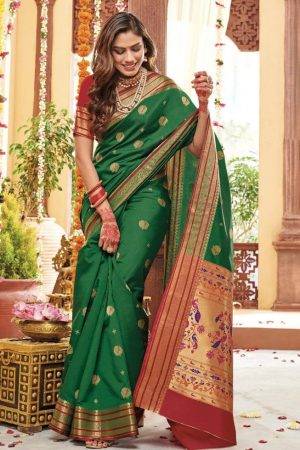 Bridal Paithani Silk Peacock Party wear Saree in Green Kelp ColorOriginal price was: ₹14,890.00.₹2,449.00Current price is: ₹2,449.00.
Bridal Paithani Silk Peacock Party wear Saree in Green Kelp ColorOriginal price was: ₹14,890.00.₹2,449.00Current price is: ₹2,449.00. -
 Buy Grey Silk Saree Floral Design Silver Border OnlineOriginal price was: ₹10,000.00.₹1,449.00Current price is: ₹1,449.00.
Buy Grey Silk Saree Floral Design Silver Border OnlineOriginal price was: ₹10,000.00.₹1,449.00Current price is: ₹1,449.00. -
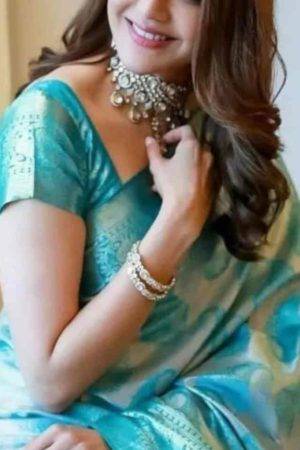 Buy Blue Silk Saree Floral Work OnlineOriginal price was: ₹8,200.00.₹1,549.00Current price is: ₹1,549.00.
Buy Blue Silk Saree Floral Work OnlineOriginal price was: ₹8,200.00.₹1,549.00Current price is: ₹1,549.00. -
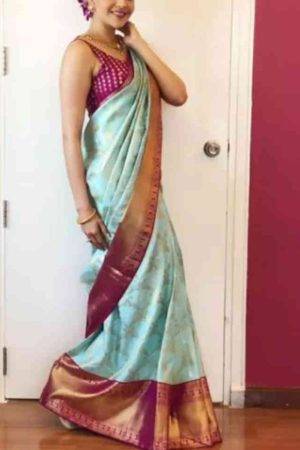 Buy Cyan Pattu Saree Floral Design Zari Border OnlineOriginal price was: ₹12,500.00.₹1,579.00Current price is: ₹1,579.00.
Buy Cyan Pattu Saree Floral Design Zari Border OnlineOriginal price was: ₹12,500.00.₹1,579.00Current price is: ₹1,579.00. -
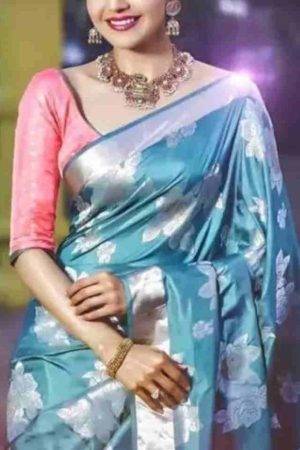 Buy Blue Silk Saree Floral Design Zari Border OnlineOriginal price was: ₹8,599.00.₹1,249.00Current price is: ₹1,249.00.
Buy Blue Silk Saree Floral Design Zari Border OnlineOriginal price was: ₹8,599.00.₹1,249.00Current price is: ₹1,249.00. -
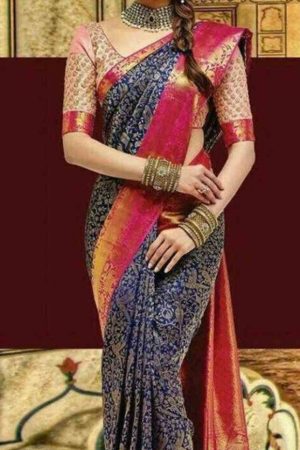 Buy Navy Blue Silk Saree Muniya Motif Floral Design Work OnlineOriginal price was: ₹12,890.00.₹1,849.00Current price is: ₹1,849.00.
Buy Navy Blue Silk Saree Muniya Motif Floral Design Work OnlineOriginal price was: ₹12,890.00.₹1,849.00Current price is: ₹1,849.00. -
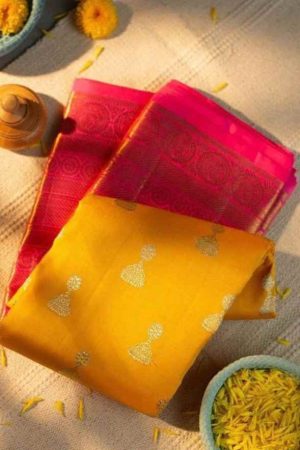 Yellow Haldi Silk Saree Pink Border Zari WorkOriginal price was: ₹9,755.00.₹1,815.00Current price is: ₹1,815.00.
Yellow Haldi Silk Saree Pink Border Zari WorkOriginal price was: ₹9,755.00.₹1,815.00Current price is: ₹1,815.00. -
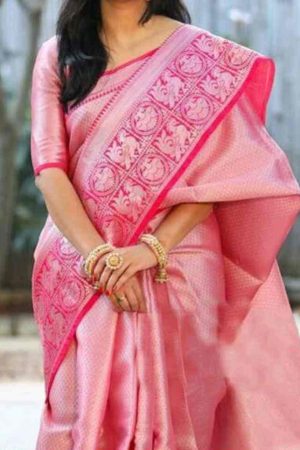 Pink Silk Woven Design Pattu SareeOriginal price was: ₹10,870.00.₹3,000.00Current price is: ₹3,000.00.
Pink Silk Woven Design Pattu SareeOriginal price was: ₹10,870.00.₹3,000.00Current price is: ₹3,000.00. -
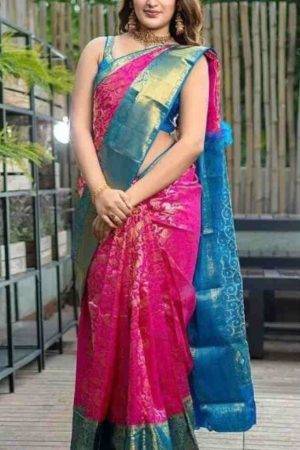 Buy Pink and Blue Silk Floral Design Saree OnlineOriginal price was: ₹6,755.00.₹2,350.00Current price is: ₹2,350.00.
Buy Pink and Blue Silk Floral Design Saree OnlineOriginal price was: ₹6,755.00.₹2,350.00Current price is: ₹2,350.00. -
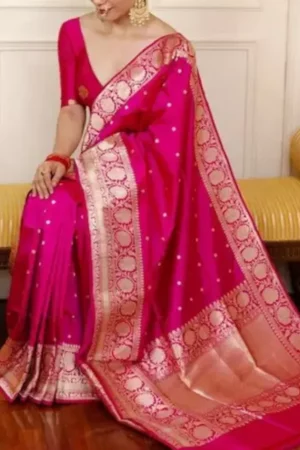 Gold & Pink Banarasi Silk Woven Floral Design SareeOriginal price was: ₹6,759.00.₹1,580.00Current price is: ₹1,580.00.
Gold & Pink Banarasi Silk Woven Floral Design SareeOriginal price was: ₹6,759.00.₹1,580.00Current price is: ₹1,580.00. -
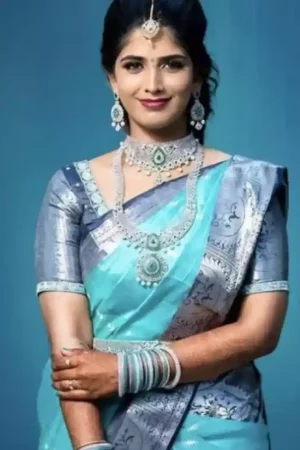 Grey & Blue Kanjeevaram Silk Jacquard Design SareeOriginal price was: ₹8,999.00.₹1,726.00Current price is: ₹1,726.00.
Grey & Blue Kanjeevaram Silk Jacquard Design SareeOriginal price was: ₹8,999.00.₹1,726.00Current price is: ₹1,726.00. -
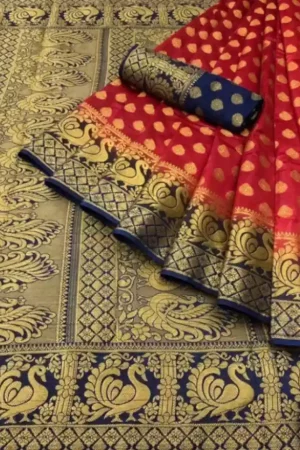 Red & Black Kanjivaram Silk Jacquard Design SareeOriginal price was: ₹6,755.00.₹1,449.00Current price is: ₹1,449.00.
Red & Black Kanjivaram Silk Jacquard Design SareeOriginal price was: ₹6,755.00.₹1,449.00Current price is: ₹1,449.00. -
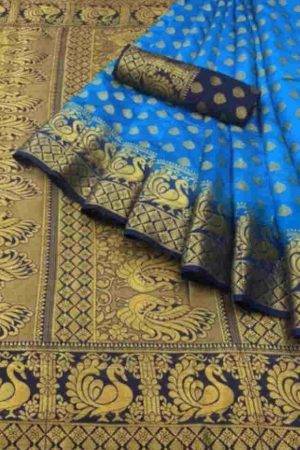 Buy Blue Silk Saree Peacock Motif Jacquard Design OnlineOriginal price was: ₹6,755.00.₹1,309.00Current price is: ₹1,309.00.
Buy Blue Silk Saree Peacock Motif Jacquard Design OnlineOriginal price was: ₹6,755.00.₹1,309.00Current price is: ₹1,309.00. -
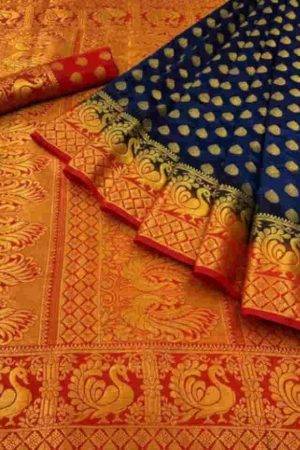 Buy Orange Blue Silk Saree Peacock Motif Jacquard Design OnlineOriginal price was: ₹6,755.00.₹1,309.00Current price is: ₹1,309.00.
Buy Orange Blue Silk Saree Peacock Motif Jacquard Design OnlineOriginal price was: ₹6,755.00.₹1,309.00Current price is: ₹1,309.00. -
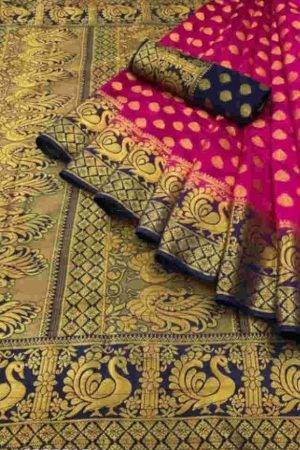 Buy Pink Blue Silk Saree Peacock Motif Jacquard Design OnlineOriginal price was: ₹6,755.00.₹1,309.00Current price is: ₹1,309.00.
Buy Pink Blue Silk Saree Peacock Motif Jacquard Design OnlineOriginal price was: ₹6,755.00.₹1,309.00Current price is: ₹1,309.00. -
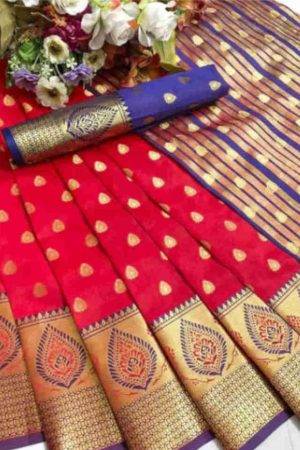 Buy Bridal Red Silk Saree Blue Border Floral Butta Zari Work OnlineOriginal price was: ₹7,568.00.₹1,559.00Current price is: ₹1,559.00.
Buy Bridal Red Silk Saree Blue Border Floral Butta Zari Work OnlineOriginal price was: ₹7,568.00.₹1,559.00Current price is: ₹1,559.00. -
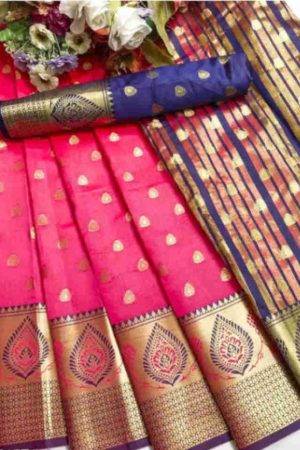 Buy Pink Silk Saree Blue Border Floral Butta Zari Work OnlineOriginal price was: ₹7,568.00.₹1,549.00Current price is: ₹1,549.00.
Buy Pink Silk Saree Blue Border Floral Butta Zari Work OnlineOriginal price was: ₹7,568.00.₹1,549.00Current price is: ₹1,549.00. -
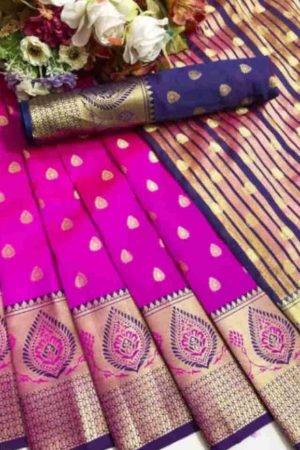 Buy Rani Pink Silk Saree Blue Border Floral Butta Zari Work OnlineOriginal price was: ₹7,568.00.₹1,449.00Current price is: ₹1,449.00.
Buy Rani Pink Silk Saree Blue Border Floral Butta Zari Work OnlineOriginal price was: ₹7,568.00.₹1,449.00Current price is: ₹1,449.00. -
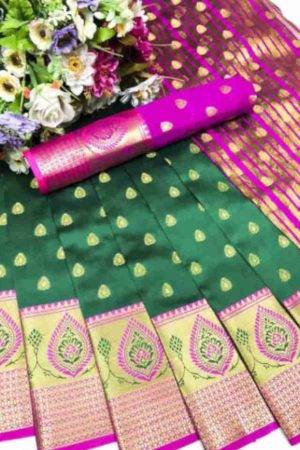 Buy Green Silk Saree Pink Border Floral Butta Zari Work OnlineOriginal price was: ₹7,568.00.₹1,549.00Current price is: ₹1,549.00.
Buy Green Silk Saree Pink Border Floral Butta Zari Work OnlineOriginal price was: ₹7,568.00.₹1,549.00Current price is: ₹1,549.00. -
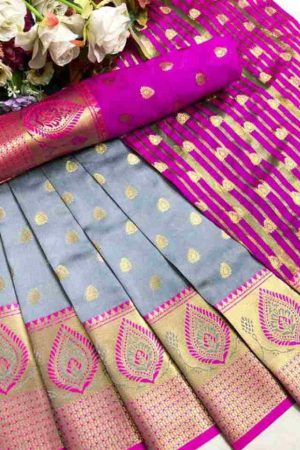 Buy Grey Silk Saree Pink Border Floral Butta Zari Work OnlineOriginal price was: ₹7,568.00.₹2,100.00Current price is: ₹2,100.00.
Buy Grey Silk Saree Pink Border Floral Butta Zari Work OnlineOriginal price was: ₹7,568.00.₹2,100.00Current price is: ₹2,100.00. -
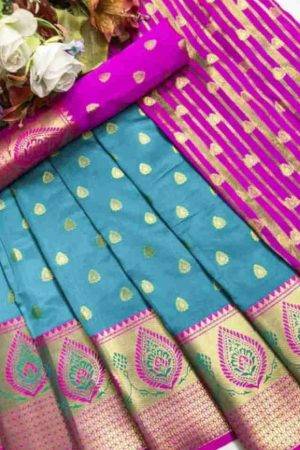 Buy Cyan Blue Silk Saree Pink Border Floral Butta Zari Work OnlineOriginal price was: ₹7,568.00.₹1,449.00Current price is: ₹1,449.00.
Buy Cyan Blue Silk Saree Pink Border Floral Butta Zari Work OnlineOriginal price was: ₹7,568.00.₹1,449.00Current price is: ₹1,449.00. -
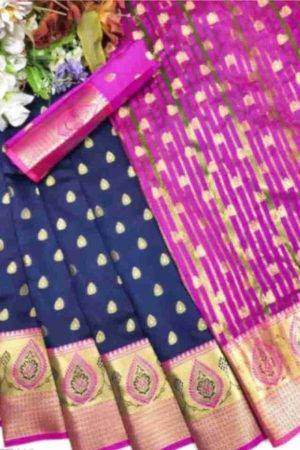 Buy Navy Blue Silk Saree Pink Border Floral Butta Zari Work OnlineOriginal price was: ₹8,568.00.₹1,449.00Current price is: ₹1,449.00.
Buy Navy Blue Silk Saree Pink Border Floral Butta Zari Work OnlineOriginal price was: ₹8,568.00.₹1,449.00Current price is: ₹1,449.00. -
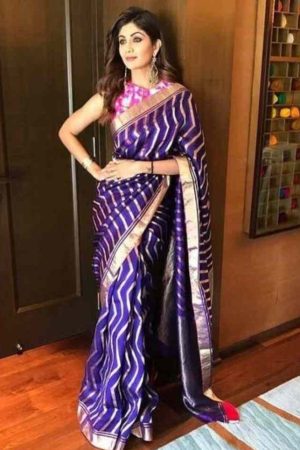 Shilpa Shetty Kundra Purple Soft Silk SareeOriginal price was: ₹7,855.00.₹1,440.00Current price is: ₹1,440.00.
Shilpa Shetty Kundra Purple Soft Silk SareeOriginal price was: ₹7,855.00.₹1,440.00Current price is: ₹1,440.00.
Kanjeevaram Silk Saree with Price List
Kanjivaram Silk Saree: The Perfect Attire for Weddings and Special Occasions
When it comes to traditional attire that embodies sophistication and charm, the Kanjivaram silk saree takes centre stage. With its rich heritage and intricate craftsmanship, the Kanjivaram silk saree has become the epitome of traditional South Indian weddings and a symbol of timeless beauty. This article will explore the history, features, styling tips, and significance of Kanjivaram silk sarees, making them a must-have for every woman’s wardrobe.
Kanjivaram silk sarees, also known as Kanchipuram silk sarees, are exquisite traditional garments that originated in Kanchipuram in Tamil Nadu, India. These sarees are renowned for their rich and intricate weaving, luxurious silk fabric, and vibrant colours. Kanjivaram sarees are traditionally handwoven using pure mulberry silk threads and adorned with detailed zari work consisting of gold and silver metallic threads. The sarees are known for their durability, lustre, and ability to retain their elegance for generations.
The weaving process of Kanjivaram sarees is a time-consuming and intricate art form. Skilled weavers meticulously create these sarees, often incorporating traditional motifs inspired by nature, temples, and mythology. The sarees typically feature wide borders, elaborate pallus (decorative ends), and detailed patterns woven with precision.
Kanjivaram silk sarees hold a high reputation; people wear them on special occasions, weddings, festivals, and cultural events in South India. The sarees have become a symbol of prestige and are considered a prized possession for many women.
What is the origin of Kanjivaram silk sarees?
Kanjivaram silk sarees originate from Kanchipuram in Tamil Nadu, India. Kanchipuram, often referred to as Kanchi, is renowned for its centuries-old tradition of handloom weaving and is considered one of the major weaving centres in India. The art of weaving Kanjivaram silk sarees has been passed through generations, and the weavers in Kanchipuram are highly skilled in creating these exquisite sarees.
The history of Kanjivaram silk sarees goes way back to the reign of the Chola dynasty in the 4th century AD. The sarees gained prominence during the authority of the Vijayanagara Empire in the 14th century. The weavers in Kanchipuram were encouraged and patronized by the royal families, developing intricate weaving techniques and designs.
Kanjivaram silk sarees are known for their distinct characteristics. They are woven from pure mulberry silk, which is locally sourced. The sarees are traditionally handwoven, each taking several weeks to complete. The weaving process involves multiple steps, including dyeing the silk threads, preparing the loom, and weaving the saree using the pit loom technique.
One of the distinguishing features of Kanjivaram silk sarees is the use of heavy gold or silver zari (metallic thread) work. The zari is intricately woven into the fabric, creating exquisite designs inspired by temples, nature, and traditional motifs. The sarees are known for their vibrant colours, contrasting borders, and pallu (decorative end piece).
Kanjivaram silk sarees are highly regarded for their quality, durability, and lustrous appearance. They are considered a symbol of luxury and are popular choices for weddings, festive occasions, and special events. The timeless beauty and craftsmanship of Kanjivaram silk sarees continue to captivate saree enthusiasts in India and worldwide.
How are Kanjivaram silk sarees made?
Kanjivaram silk sarees are made through an intricate and traditional weaving process. Here’s a general overview of how these sarees are crafted:
- Silk Selection: High-quality mulberry silk is primarily used for Kanjivaram sarees. The silk threads are carefully selected for strength, lustre, and fineness.
- Dyeing: The silk threads are dyed using vibrant colours. Natural dyes derived from plants, flowers, and minerals are often preferred to achieve traditional and organic hues.
- Yarn Preparation: The dyed silk threads are spun into yarns and then treated to enhance their smoothness and durability. The strings are typically twisted with a specific technique to add strength and flexibility.
- Warp Preparation: The saree’s warp, which forms the lengthwise threads, is created by arranging the silk yarns on a loom. The strings are stretched and tied to the loom’s frame, maintaining the desired width and pattern.
- Weaving: The weaving process begins as the weaver skillfully interlaces the weft threads (widthwise threads) with the warp threads. The weaver uses a shuttle to pass the weft thread through the warp, creating intricate patterns and motifs. The weaving is done manually, and the designs are often inspired by traditional motifs, temple architecture, nature, and mythology.
- Zari Work: Kanjivaram sarees are known for their exquisite zari work, which involves weaving metallic threads, usually gold or silver-coated copper, into the fabric. The zari adds a luxurious and decorative element to the saree, enhancing its beauty and value.
- Finishing Touches: The saree undergoes several finishing processes once the weaving is complete. These may include washing, starching, and polishing to enhance the fabric’s sheen and texture. The saree’s edges are reinforced with intricate borders, and the pallu (the loose end) is often adorned with elaborate designs.
It’s important to note that creating Kanjivaram silk sarees is a highly skilled and time-consuming process. The weavers’ expertise, the silk’s quality, and the designs’ intricacy contribute to the uniqueness and value of these sarees.
What makes Kanjivaram silk sarees unique?
Kanjivaram silk sarees are known for their unique characteristics and exquisite craftsmanship, which set them apart from other silk sarees. Here are some factors that make Kanjivaram silk sarees unique:
- Silk Quality: Kanjivaram sarees are crafted from high-quality mulberry silk. The silk used in these pattu sarees is sourced from South India, particularly Tamil Nadu, where Kanchipuram is renowned for its silk production.
- Zari Work: One of the distinguishing features of Kanjivaram sarees is the intricate and rich zari work. Zari refers to the metallic threads woven into the fabric, traditionally made of gold or silver. The zari work on Kanjivaram sarees often includes elaborate patterns, motifs, and traditional designs, adding a touch of luxury to the saree.
- Weaving Technique: Kanjivaram sarees are handwoven using a traditional weaving technique. The process involves interlacing the silk warp (lengthwise threads) and zari weft (widthwise threads) on a loom. Skilled weavers meticulously create the saree, and the weaving process can take several days to weeks, depending on the intricacy of the design.
- Durability: Kanjivaram pattu sarees are known for their durability and longevity. Using high-quality silk and robust weaving techniques ensures that these sarees can withstand regular wear and maintain their beauty for a long time.
- Vibrant Colors and Designs: Kanjivaram sarees are available in various vibrant colours and designs. These sarees often feature bold and contrasting colour combinations, intricate patterns, and motifs inspired by nature, temples, mythology, and traditional art forms.
- Nine-Yard Drape: Kanjivaram sarees are typically woven in a nine-yard length, which is longer than the standard six-yard length of most sarees. The extra length allows for more elaborate pleating and draping styles, making Kanjivaram sarees ideal for special occasions like weddings and festivals.
- Cultural Significance: Kanchipuram silk sarees hold immense cultural significance, particularly in South India. They are considered a symbol of tradition, heritage, and social status. These sarees are often passed down through generations and cherished as valuable heirlooms.
Overall, the meticulous craftsmanship, use of high-quality silk, intricate zari work, and cultural significance make Kanjivaram silk sarees unique and highly prized in Indian textiles.
How to choose the right Kanjivaram silk saree for an occasion?
Choosing the right Kanjivaram silk saree for an occasion involves considering various factors such as the design, colour, pattern, and occasion-specific requirements. Here are some steps to help you choose the right Kanjivaram silk saree:
- Occasion and Theme: Determine the experience for which you need the saree. Is it a wedding, festival, formal event, or casual gathering? Consider the theme or dress code of the event to narrow down your options.
- Colour and Design: Kanjeevaram silk sarees are known for their vibrant colours and intricate designs. Choose a colour that complements your skin tone and matches the occasion. Traditional colours like red, maroon, and gold are popular for weddings, while lighter shades or pastels can be suitable for other events. Pay attention to the design elements, such as the motifs, borders, and pallu (the decorative end piece), and choose a design that appeals to you.
- Zari Work: Kanjivaram sarees are known for their rich zari work, which involves weaving gold or silver threads into the fabric. Check the zari work on the saree and ensure it is high-quality. The zari work adds elegance and richness to the saree, so choose according to your preference and the occasion.
- Silk Quality: Kanjivaram pattu sarees are made from pure mulberry silk, known for their lustre and durability. Check the silk quality of the saree you are considering. Pure silk sarees have a distinct feel and texture. They should be soft, smooth, and have a natural sheen.
- Weaving Technique: Kanjivaram sarees are handwoven, and the weaving technique plays a crucial role in determining the saree’s quality. Look for sarees with intricate weaving patterns, well-defined borders, and neatly finished edges. The quality of the weaving reflects the skill and craftsmanship involved.
- Price Range: Set a budget for your saree purchase. Kanjivaram silk sarees come in various price ranges depending on the craftsmanship, zari work, and intricacy of the design. Choose a saree that fits your budget while meeting your quality and design preferences.
- Authenticity: Ensure that you buy Kanjivaram silk sarees from reputed sellers or brands to guarantee authenticity. Look for trusted sources or reputable stores that specialize in Kanjivaram silk sarees.
- Personal Style: Choose a saree that resonates with your unique style and makes you feel confident and comfortable. Consider your preferences, including the type of borders, motifs, and colours you are drawn to.
Considering these factors, you can select a Kanjivaram silk saree that is appropriate for the occasion and reflects your style. Exploring different options, comparing prices, and reading reviews before purchasing is always good idea.
How to take care of Kanjivaram pattu saree?
To take care of Kanjivaram silk sarees and ensure their longevity, here are some essential guidelines:
- Storage: Store your Kanjivaram silk sarees in a cool, dry place, preferably wrapped in a muslin cloth or soft cotton fabric. Avoid using plastic covers, as they can trap moisture and lead to damage.
- Avoid Direct Sunlight: Protect your sarees from direct sunlight, as prolonged exposure can cause the colours to fade. Store them in a dark or shaded area to preserve their vibrancy.
- Gentle Handling: Handle your Kanjivaram silk sarees carefully to prevent snagging or tearing. Avoid sharp objects or jewellery that can damage the delicate fabric.
- Dry Cleaning: It is recommended to dry clean your Kanjivaram silk sarees to maintain their sheen and quality. Choose a reputable dry cleaner experienced in handling silk garments.
- Ironing: Iron your saree on a low heat setting or silk-friendly setting. Place a cotton cloth between the iron and the saree to prevent direct contact and protect the fabric.
- Stain Removal: In case of stains, it is best to consult a professional cleaner rather than attempting to remove them yourself. Improper stain removal methods can cause irreversible damage to the silk.
- Avoid Perfumes and Deodorants: Keep your saree away from perfumes, deodorants, or other chemicals, as they can discolour or stain the fabric.
- Folding: When unused, fold your Kanjivaram silk saree neatly along the original pleats to minimize creases. Avoid hanging them for an extended period, as silk stretches under its weight.
- Regular Inspection: Periodically inspect your sarees for any signs of damage, including loose threads, weak areas, or insect infestations. Promptly address any issues to prevent further damage.
- Wearing Rotation: Rotate the usage of your Kanjivaram silk sarees to prevent excessive wear and tear on a particular saree. This will help distribute the use and maintain the condition of your collection.
By following these care instructions, you can preserve the beauty and quality of your Kanjivaram silk sarees for years to come.
Shop kanjivaram silk Saree in Andhra Pradesh! Free Delivery, COD cash on delivery, and Lightning-Fast 3-5 Day Arrival. Elevate Your Style Today!
- Visakhapatnam (విశాఖపట్నం): Buy beautiful sarees from Visakhapatnam, the city of pearls. We have a wide variety of sarees to choose from, including silk sarees, cotton sarees, and designer sarees.Visakhapatnam sarees for sale
- Vijayawada (విజయవాడ): Shop for sarees in Vijayawada, the capital of Andhra Pradesh. We have a great selection of sarees at affordable prices. Vijayawada sarees for sale.
- Guntur (గుంటూరు): Get the best deals on sarees in Guntur. We have a wide variety of sarees to choose from, including traditional sarees and modern sarees.
- Nellore (నెల్లూరు): Buy beautiful sarees from Nellore, the city of temples. We have a great selection of sarees at reasonable prices.Nellore sarees for sale
- Kurnool (కర్నూలు): Shop for sarees in Kurnool, the land of forts. We have a wide variety of sarees to choose from, including handloom sarees and block printed sarees.
Kurnool sarees for sale - Kakinada (కకినాడ): Get the best deals on sarees in Kakinada, the port city of Andhra Pradesh. We have a great selection of sarees at affordable prices.
Kakinada sarees for sale - Rajahmundry (రాజమండ్రి): Shop for sarees in Rajahmundry, the city of rivers. We have a wide variety of sarees to choose from, including silk sarees and cotton sarees.
Rajahmundry sarees for sale - Kadapa (కడప): Buy beautiful sarees from Kadapa, the land of hills. We have a great selection of sarees at reasonable prices.
Kadapa sarees for sale - Mangalagiri-Tadepalli (మంగళగిరి-తాడేపల్లి): Get the best deals on sarees in Mangalagiri-Tadepalli, the twin cities of Andhra Pradesh. We have a great selection of sarees at affordable prices.
Mangalagiri-Tadepalli sarees for sale - Tirupati (తిరుపతి): Shop for sarees in Tirupati, the abode of Lord Venkateswara. We have a wide variety of sarees to choose from, including silk sarees and cotton sarees.
Tirupati sarees for sale - Anantapur (అనంతపురం): Buy beautiful sarees from Anantapur, the land of forts. We have a great selection of sarees at reasonable prices.
Anantapur sarees for sale - Vijayanagaram (విజయనగరం): Get the best deals on sarees in Vijayanagaram, the city of temples. We have a great selection of sarees at affordable prices.
Vijayanagaram sarees for sale - Eluru (ఏలూరు): Shop for sarees in Eluru, the rice bowl of Andhra Pradesh. We have a wide variety of sarees to choose from, including silk sarees and cotton sarees.
Eluru sarees for sale - Nandyal (నంద్యాల): Buy beautiful sarees from Nandyal, the land of diamonds. We have a great selection of sarees at reasonable prices.
Nandyal sarees for sale - Ongole (ఒంగోలు): Get the best deals on sarees in Ongole, the commercial capital of Andhra Pradesh. We have a great selection of sarees at affordable prices.
Ongole sarees for sale
- Adoni (అడోని): Shop for sarees in Adoni, the land of lakes. We have a wide variety of sarees to choose from, including silk sarees and cotton sarees.
Adoni sarees for sale - Madanapalle (మదనపల్లె): Buy beautiful sarees from Madanapalle, the land of mangoes. We have a great selection of sarees at reasonable prices.
Madanapalle sarees for sale - Machilipatnam (మచిలీపట్నం): Get the best deals on sarees in Machilipatnam, the silk city of Andhra Pradesh. We have a great selection of silk sarees at affordable prices.
Machilipatnam sarees for sale - Tenali (తెనాలి): Shop for sarees in Tenali, the land of poets. We have a wide variety of sarees to choose from, including silk sarees and cotton sarees.
Tenali sarees for sale - Proddatur (ప్రోద్దటూరు): Buy beautiful sarees from Proddatur, the land of temples. We have a great selection of sarees at reasonable prices.
Proddatur sarees for sale - Chittoor (చిత్తూరు): Get the best deals on sarees in Chittoor, the land of hills. We have a great selection of sarees at affordable prices.
Chittoor sarees for sale - Hindupur (హిందూపురం): Shop for sarees in Hindupur, the land of temples. We have a wide variety of sarees to choose from, including silk sarees and cotton sarees.
Hindupur sarees for sale - Srikakulam (శ్రీకాకుళం): Buy beautiful sarees from Srikakulam, the land of rivers. We have a great selection of sarees at reasonable prices.
Srikakulam sarees for sale - Bhimavaram (భీమవరం): Get the best deals on sarees in Bhimavaram, the land of temples. We have a great selection of sarees at affordable prices.
Bhimavaram sarees for sale - Tadepalligudem (తాడేపల్లిగూడెం): Shop for sarees in Tadepalligudem, the rice bowl of Andhra Pradesh. We have a wide variety of sarees to choose from, including silk sarees and cotton sarees.
Tadepalligudem sarees for sale - Guntakal (గుంటకల్): Buy beautiful sarees from Guntakal, the land of forts. We have a great selection of sarees at reasonable prices.
Guntakal sarees for sale - Dharmavaram (ధర్మవరం): Get the best deals on sarees in Dharmavaram, the land of temples. We have a great selection of sarees at affordable prices.
Dharmavaram sarees for sale - Gudivada (గుడివాడ): Shop for sarees in Gudivada, the commercial capital of Andhra Pradesh. We have a great selection of sarees at affordable prices.
Gudivada sarees for sale - Narasaraopet (నరాసరావుపేట): Buy beautiful sarees from Narasaraopet, the land of temples. We have a great selection of sarees at reasonable prices.
Narasaraopet sarees for sale - Kadiri (కదిరి): Get the best deals on sarees in Kadiri, the land of temples. We have a great selection of sarees at affordable prices.
Kadiri sarees for sale - Tadipatri (తాడిపత్రి): Shop for sarees in Tadipatri, the land of temples. We have a wide variety of sarees to choose from, including silk sarees and cotton sarees.
Tadipatri sarees for sale - Chilakaluripet (చిలకలూరిపేట్): Buy beautiful sarees from Chilakaluripet, the land of temples. We have a great selection of sarees at reasonable prices.
- Gopalapuram
- Nandiguda
- Bomma Samudram
- Kondapuram
- Basivalasa
- Raparthy
- Ramannapalem
- Sreeranganagara Agraharam
- Samudrapalle
- Varadarajulapalle
- Pachigunta
- Ekarlapalem
- Chakradwarabandham
- Lemallepadu
- Pasuvemula
- Pannur
- Mudupulavemula
- Chataparru
- Antakapalle
- Sirivaram
- Gunihalli
- Balabhadrapuram
- Daleswaram
- Akkacheruvupadu
- Rellugadda
- Gandrajupalle
- Chinthalagunta
- Siddaredipalle
- Pathanoupada
- Jadupudi
- Isvi
- Atmakur
- Gudala
- Krishnapuram
- Kurli
- Buddipeta
- Gundrajukupam
- Cheyyeru
- Ugginapalem
- Paramatikona
- Yemalapeta
- Seethapuram
- Chodavaram
- Lankalagannavaram
- Viratapuram
- Ichchapuram
- Honnali
- Rompi
- Gudimetla
- Chinnakakitapalle
- Amarapuram
- Belupalle
- Samanthakuru
- Gushini
- Muthukur
- Motarchintalapalle
- Ravudi
- Pedapatnam
- Kokkiliputtuga
- Rajavanthi
- Komaragiripatnam
- Perupalem
- Kotikipenta
- Basinikonda Rural
- Obulareddipalle
- Amidala
- Mahasingi
- T. Challapalle
- Raghavapuram
- Kavanur
- Battamdoddi
- D.B.R.Bylu
- Y.V Lanka Badava
- Pedapadu
- Chintaparru
- Konathaneri
- Gollapuram
- Madupalli
- Muramanda
- Janakipuram
- Madhana Pullala Cheruvu
- Chintamakulapalle
- Dokiseela
- Perindesam
- Ducharapalem
- Chinnaradoddi
- Vanampula
- Bandaganipalle
- Kusumala
- Katriki
- Avulapalle
- Navuduru
- Kanchili
- Kothavalasa
- Jalipu:
- Jalipudivada
- Nampalle
- Nowthala
- Kambhamvaripalle
- Moggallu
- Edamakallu
- Reddipalem Bit – I
- Usulumarru
- Allur
- Kalavalapudi
- Bonthalapalle
- Vempa
- Koduru
- Akkayyavalasa
- Nakkanadoddi
- Dokiparu
- Thimmareddipalle
- Kongadokira
- Tripuravaram
- Ponnada
- Vijjeswaram
- Yerraguntlapalle
- Gavarayyapeta
- Kothakota
- Angara
- Pathapatnam
- Priyagraharam
- Jangala Palli
- Nidimamidi
- Jinnuru
- Panasapalle
- Pathur
- Mallavaram
- Pydeti
- Gattu
- Relangi
- Murikipudi
- Yendagandi
- South Valluru
- Menakuru
- Thunda
- Irlapadu
- Madur
- Erraballe
- Samareddipalem
- Ananthasamudram
- Sankhavaram
- Surappakasam
- Jegurupadu
- Machavaram
- Polasigudem
- Kasanur
- Chamaru
- Koppela
- Polimerapalle
- Vandagallu
- Pandiparthi
- Gorantla
- Lakkavaram Agraharam
- Srisailam
- Mukkinada
- Gudimula Kandrika
- Singuru
- Neliwada
- Guduru
- Maanikonda
- Kamalayyavaripalle
- Gummidigonda
- Manchuru
- Kalipi
- Devalampet
- Sanampudi
- Surepalle
- Rachuru
- Lakshmi Narasapuram
- Torraguntapalem
- Nidizivve
- Sivaramapuram
- Kanumalacheruvu
- Agraharampalle
- Chilamakuru
- Nagamambapuram
- Sirvella
- Kaikaram
- Polavaram
- Pangili
- Sankaram
- Inkolu
- Beeravolu
- Chennakkapalle
- P. Agraharam
- Ammanabrolu
- Movva
- Venkateswarapuram
- Thorur
- Mupparru
- Anandapuram
- Surepalle
- Pittalavani Palem
- Kunta
- Denkada
- Paderu
- Bhogapuram
- Addanki North U
- Srisailamgudem Devasthanam
- Repalle
